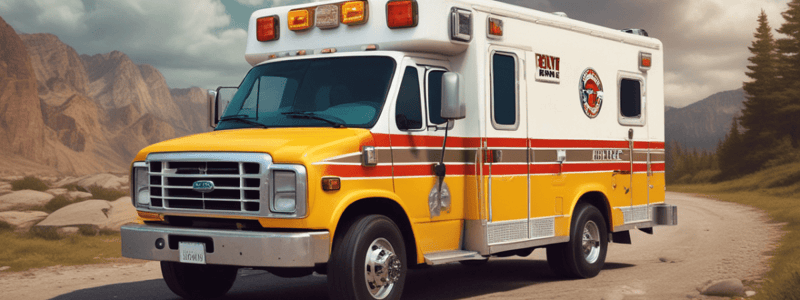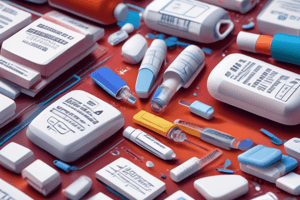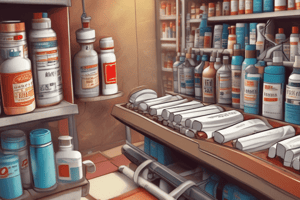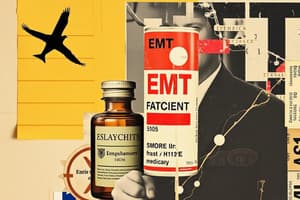Podcast
Questions and Answers
What is the primary use of naloxone in emergency medical care?
What is the primary use of naloxone in emergency medical care?
- To treat anaphylactic reactions
- To stimulate the nervous system
- To reverse opioid-related respiratory depression and coma (correct)
- To manage acute myocardial infarction
Which medication is often used in anaphylactic reactions and can be administered via the IM or SC routes?
Which medication is often used in anaphylactic reactions and can be administered via the IM or SC routes?
- Aspirin
- Nitroglycerin
- Epinephrine (correct)
- Diphenhydramine
Which of the following medications is used for analgesia and antipyresis?
Which of the following medications is used for analgesia and antipyresis?
- Ibuprofen
- Nitroglycerin
- Oral glucose
- Aspirin (correct)
What is the primary use of nitroglycerin in emergency medical care?
What is the primary use of nitroglycerin in emergency medical care?
Which medication is used to reverse opioid-induced respiratory depression within 30 seconds?
Which medication is used to reverse opioid-induced respiratory depression within 30 seconds?
Which of the following medications is NOT mentioned as a pre-hospital medication for acute myocardial infarction?
Which of the following medications is NOT mentioned as a pre-hospital medication for acute myocardial infarction?
What is the primary use of naloxone?
What is the primary use of naloxone?
Which medication is used to treat anaphylaxis and cardiac arrest?
Which medication is used to treat anaphylaxis and cardiac arrest?
What is the primary use of aspirin?
What is the primary use of aspirin?
Which medication is administered via the non-rebreather mask or the oxygen mask?
Which medication is administered via the non-rebreather mask or the oxygen mask?
What is the primary use of activated charcoal?
What is the primary use of activated charcoal?
Which medication is used to treat allergic reactions?
Which medication is used to treat allergic reactions?
Study Notes
EMT Medications
EMTs are trained to provide emergency medical care and may utilize a wide range of medications to manage various medical conditions. This article focuses on the medications commonly used by EMTs, including naloxone, epinephrine, aspirin, nitroglycerin, activated charcoal, oxygen, oral glucose, diphenhydramine, ibuprofen, and other medications.
Naloxone
Naloxone is a medication used to reverse opioid-related respiratory depression and coma. It has a ½ life of about 20 minutes and is effective in reversing opioid-induced respiratory depression within 30 seconds. It is administered via the IV, IM, SC, or IN routes. High doses of naloxone (up to 10 mg) may be required for patients who have taken or ingested large amounts of opioids or potent synthetic opioids.
Epinephrine
Epinephrine is a medication used to stimulate the nervous system, causing bronchodilation. It is often used in anaphylactic reactions and can be administered via the IM or SC routes. Epinephrine is available in various forms, such as auto-injectors like the EpiPen.
Aspirin
Aspirin is an over-the-counter medication used for analgesia and antipyresis. It is also used in some EMS systems as a pre-hospital medication for acute myocardial infarction when administered in the context of a medical director's protocol.
Nitroglycerin
Nitroglycerin is a medication used for the management of acute myocardial infarction. It is available in various forms, including sublingual tablets and sprays, and is administered via the sublingual route.
Activated Charcoal
Activated charcoal is used in the management of certain poisonings, such as overdoses of certain medications. It is administered via the PO route.
Oxygen
Oxygen is used for respiratory support in emergency situations. It is administered via the non-rebreather mask or the oxygen mask.
Oral Glucose
Oral glucose is used in the management of hypoglycemia. It is administered via the PO route.
Diphenhydramine
Diphenhydramine is an antihistamine used for the treatment of various allergic reactions. It is administered via the IM or IV routes.
Ibuprofen
Ibuprofen is a non-steroidal anti-inflammatory drug (NSAID) used for pain relief and antipyresis. It is available over the counter and is administered via the PO route.
Other Medications
EMTs may also carry other medications, such as epinephrine, which is used for various indications, including anaphylaxis, and is available in various forms, such as the auto-injector EpiPen. Other medications include furosemide, glucagon, haloperidol, ipratropium, methylprednisolone, naloxone, nitroglycerin, pralidoxime, racemic epinephrine, and sodium bicarbonate.
In conclusion, EMTs are trained to use a variety of medications to manage a wide range of medical conditions. These medications include naloxone for opioid overdoses, epinephrine for anaphylaxis and cardiac arrest, aspirin for myocardial infarction, nitroglycerin for acute myocardial infarction, activated charcoal for certain poisonings, oxygen for respiratory support, oral glucose for hypoglycemia, diphenhydramine for allergic reactions, and ibuprofen for pain relief. EMTs may also carry a range of other medications for specific indications.
Studying That Suits You
Use AI to generate personalized quizzes and flashcards to suit your learning preferences.
Description
This quiz covers the various medications used by EMTs to manage different medical conditions, including naloxone, epinephrine, aspirin, nitroglycerin, and more. Test your knowledge of EMT medications and their indications.




